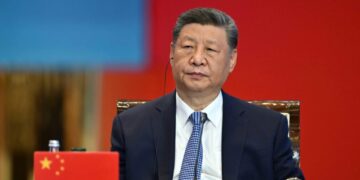By Emmanuel Nduka Obisue
The “japa” dream, a slang term that has come to define the mass exodus of Nigerians seeking greener pastures abroad may gain new momentum, following Japan’s designation of Kisarazu, a coastal city in Chiba Prefecture, as the official “hometown” for skilled Nigerian migrants.
The announcement, made during the 9th Tokyo International Conference on African Development (TICAD 9) in Yokohama, opens a fresh chapter in the story of migration between Africa’s most populous nation and Asia’s second-largest economy. It also marks a new chapter in cultural diplomacy and labour migration between the two countries.
Japan, battling an ageing population and shrinking workforce, is appears to be looking outward to fill critical skill gaps. For Nigeria, where unemployment, insecurity, and economic uncertainty continue to drive citizens abroad, the initiative presents both an opportunity and a dilemma.
Rising Japa Trend
The scale of Nigeria’s migration wave is staggering. According to the International Organisation for Migration (IOM), about 17 million Nigerians currently live abroad, with more than 3.6 million leaving between 2022 and 2023 alone. In 2022, the World Bank’s report showed that diaspora remittances reached $21.9 billion, a figure that now rivals crude oil as a lifeline for the Nigerian economy.
The United Nations Department of Economic and Social Affairs (UNDESA) also notes that Nigeria has one of the fastest-growing emigrant populations in sub-Saharan Africa, with Canada, the United Kingdom, and the United States being top destinations. Analysts predicts that the addition of Japan as an attractive migration hub will likely intensify this wave.
Prominent Nigerians have repeatedly raised concerns. In 2023, the Governor of the Central Bank of Nigeria (CBN), Olayemi Cardoso, described the brain drain as “a silent emergency that robs the nation of its best and brightest” minds. Similarly, human rights lawyer Femi Falana once lamented: “We train doctors, engineers, and IT specialists with taxpayers’ money, only for them to end up powering foreign economies”.
What Is Japan Offering?
Under the new arrangement, Japan will roll out a special visa category tailored for “highly skilled, innovative, and talented young Nigerians”. This includes opportunities for artisans and blue-collar workers willing to upskill under a special dispensation visa. The initiative is designed to attract talent and revitalize Kisarazu’s local economy.
At the signing ceremony on Friday, August 22, Nigeria’s Charge d’Affaires, Florence Adeseke, received the certificate confirming Kisarazu’s status alongside Mayor Yoshikuni Watanabe, as governments hailed the partnership as a symbol of long-term cooperation.
Nigeria’s Minister of Foreign Affairs, Ambassador Yusuf Maitama Tuggar, who led discussions at TICAD 9, said the development reflects “a renewed era of global partnerships” and invited Japanese companies to invest in Nigeria’s energy transition, digital economy, and vocational training. “Ambassador Tuggar further invited Japanese technology companies to participate in Nigeria’s Smart City and Digital Economy initiatives and sought greater cooperation in science, innovation, and health systems strengthening,” Alkasim Abdulkadir, Special Adviser on Media to the Minister, was quoted as saying.
Why Kisarazu?
Kisarazu, situated along Tokyo Bay and just an hour from central Tokyo, embodies both tradition and modern connectivity. With a population of about 136,000, the city is famed for its Edo-era Kōzō-ji Temple, the iconic Nakanoshima pedestrian bridge, and the Kisarazu Port Tower, offering sweeping views of Mt. Fuji. Furthermore, its underground library, completed in 2022, has become a symbol of sustainability and innovation.
The city is also a strategic industrial hub, with sectors spanning commercial fishing, agriculture, chemicals, and electrical machinery. More recently, it has evolved into a commuter town for Tokyo and Yokohama, thanks to the Tokyo Bay Aqua-Line, a bridge-tunnel that slashes travel time to the capital.
Notably, Kisarazu has prior ties with Nigeria. It hosted the Nigerian Olympic team during their pre-Games training in 2021. That bond has now been formalized into a “hometown” status, blending sports diplomacy with migration policy.
Japan’s Prime Minister Shigeru Ishiba has pitched this move as part of a broader “co-creation” vision with Africa. At TICAD 9, he pledged $5.5 billion in investments across the continent, focusing on private-sector growth, youth and women empowerment, and regional integration. He also called for mutual support, pointing to Japan’s demographic challenges: an ageing society and declining farmland.
Other African countries also benefitted, with Nagai in Yamagata Prefecture paired with Tanzania, Sanjo in Niigata Prefecture with Ghana, and Imabari in Ehime Prefecture with Mozambique.
Nigeria’s Crossroads
For Nigeria, the new Kisarazu chapter is a double-edged sword. While it opens opportunities for citizens to thrive abroad, it further highlights the failure to retain talent back home. Analysts warn that continued migration of skilled workers could weaken Nigeria’s capacity for growth.
“When the most productive age groups exit in large numbers, the economy loses not only human capital but also the innovation and tax revenue needed for national development,” Dr. Ayo Teriba, CEO of Economic Associates, observed at a recent forum.
Yet, for millions of young Nigerians, the choice seems clear. With rising inflation, dwindling job prospects, and security concerns, migration offers a lifeline. As one social commentator bluntly put it: “Japa is not just a trend anymore, it’s survival. It’s the core of our failings as a nation. Nigerians keep leaving in droves”.
Still, for many young Nigerians, the debate is less about macroeconomics and more about survival. The promise of Kisarazu offers a tempting possibility of stable jobs, safety, and dignity, things young Nigerians feel are slipping further out of reach at home.




































